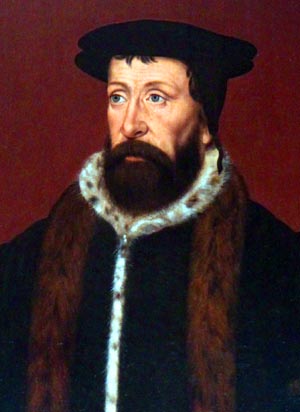 |
 |
|||
|
|
Sir John Mason, to whose influence Abingdon owes the charters both of Christ's Hospital and of the Borough, was the most famous native of that town since St. Edmund of Abingdon. He was born in Abingdon, the son of a cowherd and nephew of a monk, perhaps of Thomas Rowland II (alias Pentecost), the Abbot of Abingdon, who educated him. He graduated from Oxford University in 1521 and was made a Fellow of All Souls. Then he became King's Scholar in Paris with an annual allowance of £3.6s.8d, which was afterwards doubled. In 1531, he was given the parish church of Kyngeston in the diocese of Salisbury. At this point, he entered the diplomatic service, was present in 1532 at the meeting of Henry VIII and Francis I at Calais, and was sent on tour through France, Spain and Italy with a view to further diplomatic work. In 1535, he visited Spain, Padua and other towns of Italy, Corsica, Sardinia, the Lipari Islands, Sicily and Naples. He returned in 1536 and there is a tradition that, at this period of the Reformation, he saved the endowments of Oxford from confiscation. If that is so, Mason averted a national disaster with an incalculable train of consequence. In 1537, he was secretary to Sir Thomas Wyatt, the British Envoy in Spain. In 1539, he was in the Netherlands reporting to the Government. In 1540, he was again with Wyatt. A shrewd judge said of him, “None seeth further off than Sir John Mason”. In 1542, he became Clerk to the Privy Council; in 1544, Master of the Posts and Secretary of the French Tongue. In December of that year, he describes the proroguing in person of Henry VIII's last Parliament. In 1545, he was licensed to import French wares. In that year, he visited Norfolk, 'Almaigne', and the court of Philip, Duke of Bavaria. At the coronation of Edward VI, he was dubbed Knight of the Carpet. About the same time, he received £20 for searching the records for English claims upon Scotland. In 1549, he was made Dean of Winchester; also a commissioner to negotiate the treaty with France, to which country he was appointed Ambassador in 1550. From this time, his letters rank as important historical documents. His health failing, he asked to be relieved of his post, and retired in 1551. He became Master of Requests and Clerk of Parliament. In 1552, he received grants of land in Middlesex, Berkshire and Kent. He was elected Member of Parliament for Reading and, afterwards, for Taunton. From 1552 to 1556, he was Chancellor of Oxford University - perhaps as a reward for his services in 1536. He was a witness to Edward VI's will: yet he joined the Lord Mayor in proclaiming Queen Mary, and signed the Order in Council requesting the Duke of Northumberland to lay down his arms. Being high in Mary's favour, in spite of his Protestantism, he continued to hold his secular preferments. In 1554, he was made Treasurer of the Chamber - the salary for this office and for the Mastership of Posts is given as £240 a year and 12d a day. In that year, he was Member of Parliament for Southampton. From 1553 to 1556, he served as Ambassador at the Holy Roman Emperor's Court in Brussels, and was an eyewitness of the famous scene of Charles V's abdication, of which he has left an interesting account. Under Queen Elizabeth I, he still retained his posts and was restored to the Deanery of Winchester. From 1559 to 1564, he was again Chancellor of Oxford. During the opening years of Elizabeth's reign, he had the direction of foreign policy. At his death in 1566, he was buried in St. Paul's Cathedral (London), leaving no issue, although Lady Mason had family by a previous husband. His principal heir was his adopted son, Anthony Wyckes alias Mason, grandson of Mason's mother, who succeeded him in 1574 as Clerk of Parliament, and was in turn succeeded in that office by another Abingdonian, Sir Thomas Smith. Such a record of work carries with it the proof of Mason's energy and talents. It was a wonderful thing to win and keep high offices in such stormy times under four such monarchs as King Henry and his three children who succeeded him. He is described as a cautious diplomatist, but as a man who was genial in society. His most striking talent was his cool, unerring judgment of the trend of events. His services to his native town were very great, and their effects continue to the present day. Edited from James Townsend's 'A History of Abingdon' (1910)
|
|||
| © Nash Ford Publishing 2005. All Rights Reserved. | ||||



 Sir
John Mason (1503-1566)
Sir
John Mason (1503-1566)